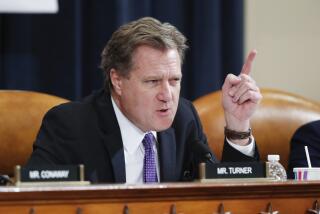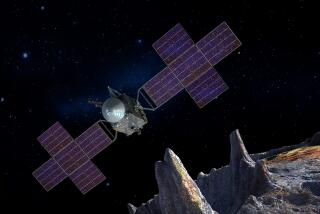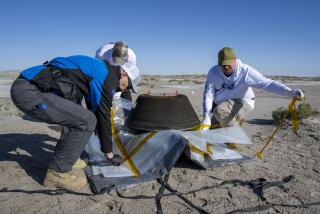Danger, Will Robinson: Asteroids headed to Earth?
- Share via
WASHINGTON – As if you don’t have enough to worry about, consider the subject of a Capitol Hill hearing Wednesday: asteroids that may be headed toward Earth.
The good news: NASA is tracking most of the largest asteroids – the kind that a witness said “would likely end civilization” were they to hit.
“None of these civilization-enders thus far discovered is known to be on an impact course any time in this upcoming century,” Ed Lu, a former astronaut who heads a group working to launch a space telescope to track threatening asteroids, told the House Space, Science and Technology Committee.
But there may be a lot of potential “city destroyers” up there that have yet to be detected.
“NASA has not even come close to finding and tracking the 1 million smaller asteroids that might only wipe out a city,” Lu said. “We can protect the Earth from asteroid impacts, but we can’t do it if we don’t know where the asteroids are.”
The Capitol Hill hearing was the third on space threats since a 60-foot asteroid exploded over Russia in February, injuring about 1,500 people and causing millions of dollars in damage. On the same day, a 130-foot asteroid passed within 17,200 miles of Earth.
The hearing also came as President Obama sent to Congress a proposed budget that includes funding to help NASA step up its efforts to identify space threats and send an astronaut to an asteroid by 2025.
Committee Chairman Lamar Smith (R-Texas), holding up a small piece of the asteroid that exploded over Russia, called it troubling that scientists had identified only 10% of up to 20,000 asteroids that could potentially destroy a city.
The asteroid explosion over Russia and the close fly-by on the same day “demonstrate that even extremely improbable events can happen, and that it is prudent to pay attention to the problem of finding and tracking all potentially hazardous near-Earth asteroids,” Donald K. Yeomans, manager of NASA’s Near-Earth Object Program Office at the Jet Propulsion Laboratory, said in his written testimony.
“We have the technology to deflect asteroids to prevent an impact on Earth, but this technology is useless until we find asteroids first,” said Lu, who heads the B612 Foundation, a Silicon Valley-based group named after the asteroid home of “The Little Prince.”
Yeomans noted that a spacecraft could ram an asteroid, “modifying its orbital velocity by a very small amount, so that over several years its trajectory would be modified and its predicted impact of Earth in the future avoided by a safe margin.” NASA officials, however, are worried that tighter budgets could delay its work.
Lawmakers said they hoped to see other countries help foot the bill for planetary defense.
“I don’t know how we can go about protecting the world if we don’t have world support,” said Rep. Ralph Hall (R-Texas).
More to Read
Sign up for Essential California
The most important California stories and recommendations in your inbox every morning.
You may occasionally receive promotional content from the Los Angeles Times.











